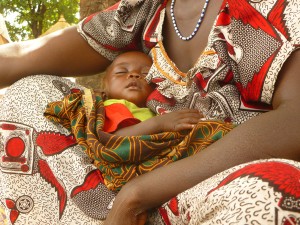Evaluation at a Glance: Chad
WFP-UNHCR Mixed Method Impact Evaluation in Chad
The Contribution of Food Assistance to Durable Solutions in Protracted Refugee Situations: its impact and role in Chad
|
CLIENT
World Food Programme and UNHCR
COUNTRY
Chad
TEAM
Pierre Leguéné*
Covadonga Canteli
Tim Morris
Soledad Posada
Mija‐Tesse Ververs
Brigitte Topinanty*Team leader
ORIGIN OF FUNDING
WFP and UNHCR
DATES
April-December 2012
FULL REPORT (French)
DARA’s Impact Evaluations
Impact evaluations look at the wider, longer-term results and effects of a project, programme or intervention on socioeconomic and political contexts. We have carried out evaluations that specifically addresses impact in Chad, Bangladesh and Cambodia.
Read about DARA’s Mixed Methods Approach to Impact Evaluations |
|
|

 Refugee child in UNHCR camp of Amboko Need for learning and accountability in the impact of food assistance to refugees in protracted crises
The World Food Programme (WFP) and the UN Refugee Agency (UNHCR) commissioned DARA an impact evaluation of the food assistance provided to Central African refugees living in camps along Chad’s southern border and nearby host communities. This evaluation is part of four joint WFP–UNHCR impact evaluations (Bangladesh, Ethiopia and Rwanda). This series aims to inform WFP and UNHCR on how to improve the effects food assistance has on refugee populations’ opportunities to attain self-reliance and longer-term durable solutions.

Growing refugee population in Chad
The presence of an ever‐growing refugee population places considerable strain on Chad’s scarce and fragile resources. Measures to alleviate this pressure are an operational priority both for WFP and UNHCR, along with the pursuit of durable solutions in the form of repatriation or resettlement, where feasible.

Food assistance improved food consumption levels and malnutrition rates but did not increase capacity of the refugees to develop their own livelihoods
The evaluation used mixed methods and found that:
- In the first years following the displacement, general food distribution in the form of full rations allowed refugees to reach acceptable food consumptions levels. It also had a positive effect on global acute malnutrition.
- However, refugees’ wealth levels and income sources did not significantly improve over time and did not match those of the local population.
- The expected evolution towards and increased capacity for refugees to develop their own livelihoods in the medium term, and thus to maintain their food security despite a reduction in food assistance, did not occur.
- These mixed results are attributed to the absence of a common strategy between agencies for promoting self-reliance.

Promote self-reliance of refugees
WFP and UNHCR need to define a strategy for the transition to refugee livelihood development and self-reliance. This includes appropriate tools, staffing and alternative assistance modalities, as well as adequate monitoring and evaluation of programmes.
FULL REPORT (French) |

Share this